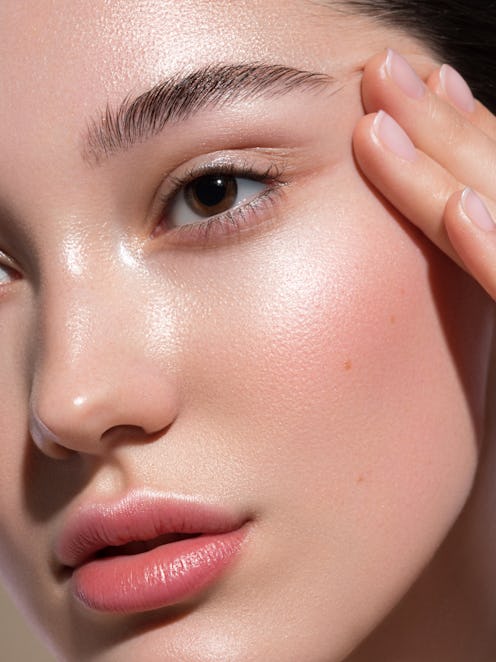(Beauty)
This Is Why Ceramides Are In All Your Skin Care Products

With new product brands, launches, and categories popping up every day, beauty can be a bit overwhelming. Back to Basics, our new rudimentary beauty series, serves as your crash course on the science behind some of the best formulations in the game.
Despite slathering on oils and moisturizers, fighting the war against dehydrated or dry skin can feel like an endless battle. Luckily, that tight, uncomfortable feeling can be a distant memory with ceramides in skin care. Although everyone waxes poetic about the benefits of hyaluronic acid for hydration, ceramides are the lesser known ingredient that deserve a place in your beauty arsenal.
Ceramides In Skin Care: What They Are
Ceramides are a naturally occurring type of lipid, or fat, that comprise an extremely important part of the outer layer of the skin, known as the skin barrier. Dr. Ted Lain, board-certified dermatologist and Chief Medical Officer at Sanova Dermatology, explains that this barrier plays a crucial role in the function of healthy skin as it is the skin’s first line of defense, acting to repel environmental aggressors and retain moisture. “The barrier itself is made up of dead skin cells (the bricks) that are held together by a lipid bilayer (the mortar). Ceramides make up 50% of this mortar, hence their importance.” You can think of them as building blocks because they help form a protective layer that wraps the skin to lock in hydration in while keeping bacteria, pollution, and UV rays out at the same time. In other words, ceramides assist in helping your skin barrier perform at its best.
Ceramides In Skin Care: The Benefits
If we think of ceramides as skin care security guards that prevent any unwanted guests coming in, their most important benefit is keeping the protective outer layer in tip-top condition. “Having a compromised skin barrier not only leads to moisture loss, but can also cause additional irritation like redness, inflammation, itchiness, rough texture, and fine lines,” Chabely Robles from Dr Jart explains. Although our bodies are made up of close to 70% water, according to the Journal of Biological Chemistry, this decreases as it reaches the skin's surface, so it’s paramount we retain as much as possible. “Ceramides help hold healthy cells together, which keeps the skin’s moisture level balanced and optimally hydrated for dewy, smooth, and soothed skin,” Dr. Lain explains. Due to their mega-nourishing properties, they also provide extra relief and comfort if you’ve ever gone OTT with retinol or exfoliating acids.
Ceramides In Skin Care: What Skin Types Can Use Them
As ceramides are a naturally occurring component of healthy skin, all skin types can use them. Although our skin naturally produces ceramides too — just like hyaluronic acid and collagen — they also start to deplete as we age. “Ceramide production naturally decelerates but we can also lose them from daily, habitual activities like washing our hands, taking a shower, or laying in the sun. The exposure to hot water, chemicals, and external aggressors all contribute to a decrease in ceramides regardless of your skin type,” Robles tells TZR.
That being said, Dr Lain reminds us that ceramides are especially beneficial for those with dry or sensitive skin. “Skin complaints such as eczema, rosacea, psoriasis and dermatitis are often exacerbated by the cold, dry climates of fall and winter. Incorporating ceramides into a skin care regime not only helps to strengthen the skin barrier, making it more resilient but also helps to comfort and soothe any irritation.”
Ceramides In Skin Care: How To Use Them
Ceramides are great team players that play beautifully with a whole host of other skin care ingredients and can be found in everything from cleansers to night creams. A Dr. Jart representative tells us that there are different types of ceramides found in the skin, all of which have slightly different functions and therefore using products with multiples types can be beneficial. “Using more than one ceramide enables the creation of a stronger skin barrier that means more moisture is retained within the skin. When more moisture is retained, skin tends to be less dry, itchy, and irritated.” Moisturizers are often the most beneficial vehicle to get ceramides into your routine, particularly for those with dry or flaky skin but choose a formula and texture best-suited to your skin type. Combination and oily skins can opt for light lotions and serums.
If the benefits of this skin savior weren’t enough, ceramides also work wonders for hair too, helping to strengthen our tresses in the same say it rebuilds our skin barrier. Naturally found in the cuticle and therefore responsible for hair smoothness, moisture retention and elasticity, our own ceramides deplete from excess heat, chemical processes such as coloring and over-washing. Feeding the hair with ceramides helps to flatten the cuticle and minimize damage.
Ahead, check out our top ceramides picks that can quite literally be used from head to toe to nourish, nurture and protect.
We only include products that have been independently selected by The Zoe Report’s editorial team. However, we may receive a portion of sales if you purchase a product through a link in this article.
Experts:
Dr. Ted Lain, MD, and Chief Medical Officer at Sanova Dermatology